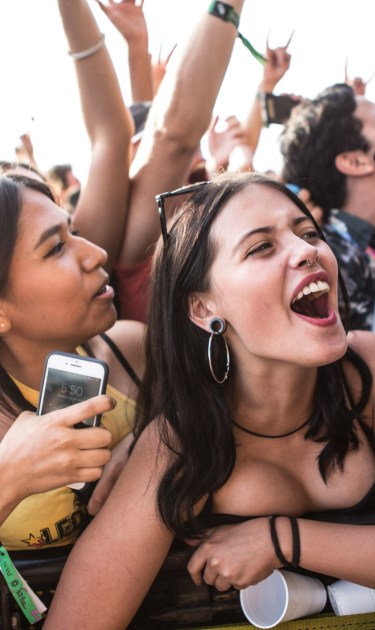Feminist collective Ruidosa’s recently published investigation about the lack of women’s representation in Latin American music festivals detailed numbers so alarming, it caused Argentinian musicians to team up to propose a law asking music festivals to have a minimum of 30% female artists in their lineups. “La Ley de Cupo Femenino,” (based on the law of the same name that passed 1991 requiring the same percentage of representation in government), was passed on May 22nd by the senate with 50 votes for, and only one against it. Now the senate’s deputies have to debate and vote for it to be ratified.
The project began when musician Celsa Mel Gowland, who is also the former vice-president of the National Institute of Music, began investigating how to achieve better representation for women. Around the same time, Mariana Päraway played at an event in Mendoza called “Mujeres con voz,” where senator Anabel Fernandez Sagasti was present. “I sang but I also said many things about the place of women in the music scene, and how we should support them,” Päraway told Remezcla. “Anabel was really touched by these words, and it made her think that something had to be done,” she added. This is how Mel Gowland and Fernandez Sagasti got in contact, and later received the support of more than 700 female musicians.
“I think quota laws are a good initiative because humanity is imperfect and we tend to not correct certain issues unless we visibilize them.”
Ruidosa’s report showed that Argentina had the lowest percentage of female presence in music festivals in Latin America. Between 2016 and 2018, only between 14% and 20% of artists booked at festivals included women and if only counting exclusively female artists, there were only between 7.4% and 4.6%. Another investigation showed that there was only one music festival that had more than 30% female artists in its lineup. Chilean artist Francisca Valenzuela, who created Ruidosa, told Remezcla that it was very emotional hearing about this movement and added, “I think quota laws are a good initiative because humanity is imperfect and we tend to not correct certain issues unless we visibilize them.”
The festival with the least number of female artists of 2018 in all Latin America was Cosquín Rock, held in Córdoba, Argentina. In 2019, its lineup fared no better for women, and when asked about the Ley de Cupo Femenino, José Palazzo, its organizer, said that it would be difficult to implement a law like that because of a supposed lack of talented women making music. “These artists wouldn’t be at the level of the festival and I’d have to leave out other male talented artists,” he said.
Päraway thinks Palazzo’s comments are “the reflection of what many people think.” Indeed, scanning tweets and comments on social media, one can easily find many people who are vocally against the law. “They complain because they believe it will violate their freedom of choice, but that is already happening because of economic and cultural reasons,” she said. Considering that female quota laws also had to be passed to include women in other activities (such as politics) it became obvious that they are more than necessary. “If today, in a natural and organic way,” said Valenzuela, “we can’t achieve more participation of women and other minorities – not only in music festivals, but also in management positions or in trade unions – it is important to be aware of this issue and take action to make a change.”
“They complain because they believe it will violate their freedom of choice, but that is already happening because of economic and cultural reasons.”
But there’s been many misconceptions about exactly what the law entails – mostly due to a misinterpretation of the law, or people simply not reading the details.
So what does 30% mean exactly? To start, the law will apply only to music events that have more than three acts. If a band has both male and female members, it will be considered a “female act” if 30% percent of the members are women. For example, if it is a 3-piece band, and one of them is a woman, then they will count towards the quota. This of course doesn’t apply to back up band members for solo artists.

There have been female artists for a long time in Argentina and all over the world, but the problem, as Päraway said, is that “there is a blanket covering our work, our music. It would be great if this stopped happening and people discovered that there are many women doing music.”
Just two weeks ago, Marilina Bertoldi won the Gardel de Oro, the main category of Premios Gardel – arguably the most relevant music awards in Argentina. It was only the second time a woman won this category, the first time being Mercedes Sosa in 2000. Another historic achievement is that this year, Lali became the first woman ever to win Song of the Year.
Valenzuela agrees with Päraway, and also sees that women are often erased in this industry. “We don’t realize when there aren’t women, but we have to be conscious of it, and I think these kind of laws bring up the issue.” And maybe this law won’t be the perfect solution to the problem (there are countless questions to be raised regarding non-binary performers), but it surely sparks the kind of progress and conversations that could lead to laws like this one day becoming obsolete.





